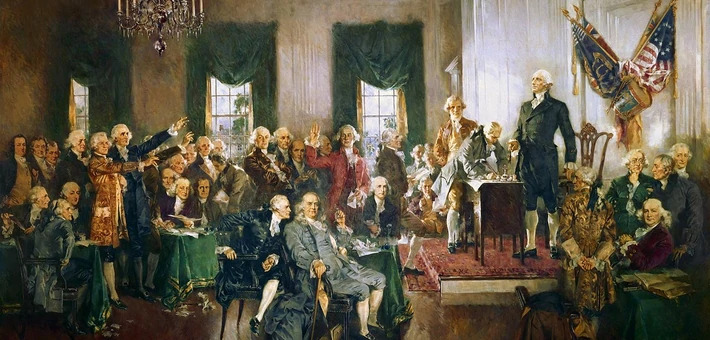“It was never meant to be a sort of direct democracy, where all Americans would get to cast a ballot on all issues,” says Andrew Wehrman, an associate professor of history at Central Michigan University. “The vote itself, they thought, ought to be reserved for people of wealth and education, but they certainly didn’t want to restrict all those other kinds of political participation.”
The founders expected the common people, the poor and uneducated, to participate indirectly, through their local government, at town halls and meetings and through protest actions like boycotts.
Some of the founders were particularly concerned about populism and mob rule.
“These were the kinds [of people] that thought that democracy was a dirty word. Even John Adams said stuff like that. He didn’t want poor people to vote, he didn’t want women to vote,” Wehrman says.
Bruce Kuklick, a professor of American history emeritus at the University of Pennsylvania, says the framers of the Constitution had a very different idea of democracy than Americans do today.
“The founders didn’t want this sort of democracy at all. The Constitution is written so that citizenship rights are very, very limited,” he says. “They worried about democracy … It was a bad form of government because once you let everybody participate, then you’re likely to elect a demagogue. You’re likely to have people come to power who appeal to the frenzy of the masses. That idea is long gone.”
Wehrman points out that the framers of the Constitution saw to it that only one part of one branch of the federal government, the House of Representatives, is popularly elected by the people. The Electoral College chooses the president, the commander in chief selects the Supreme Court justices and, originally, senators were selected by state legislatures.
“It’s another attempt to kind of whittle away at the direct participation of a large group of people in the political process,” Kuklick says. “So there are all these other constraints that they write into the Constitution to shore up what they think might be a leaky vessel, where too many ignorant, poor people get the right to vote.”
It was only after the 1913 ratification of the 17th Amendment to the Constitution that U.S. senators were elected by direct popular vote.
“Clearly, the Constitution was written and enacted to pull back some of the actions that were taken by state legislatures. People like James Madison and Alexander Hamilton thought that the state legislatures and voters in most states had gone too far, that too many people were participating in politics, too many people were voting,” says Wehrman.
For example, New Jersey gave the right to vote to residents who could reach a certain property ownership threshold. This included women and African Americans, who were able to vote from 1776 until 1807, when the state restricted voting rights to white men.
“They (the founders) thought that there were too many voices in the state legislatures, that states were becoming too radical, that they were beholden to the interests of the common man, when they needed to be more reserved and more accommodating to wealthy, educated business-interest types,” Wehrman says.
So what would people like Alexander Hamilton, John Adams and the other framers of the Constitution think about America today?
“I think they would all be sort of delighted that the general framework that they created is still in action,” Wehrman says.
And they might even be open to change. After all, they did write in a process for changing or amending the Constitution. They even availed themselves of that process with the ratification in 1804 of the 12th Amendment, which established separate Electoral College votes for president and vice president. The tweak kept political adversaries from opposing parties from serving in the same administration as president and vice president.
Even so, Kuklick says, the Founding Fathers would be considered reactionaries by today’s standards.
“[They] didn’t want what came to be,” Kuklick says. “And one of the amazing transformations of the United States in the 19th century is that we go from having this very, very limited view of participation by the people in the government, to the one that people just now completely accept as being the democratic way.”
Although democracy in action today might not be exactly what the founders envisioned, money and power do continue to play a vital role in U.S. politics. And, given that the vast majority of American presidents have been independently wealthy, the founders’ aim of reserving a prominent place in government for the rich has essentially been realized.





